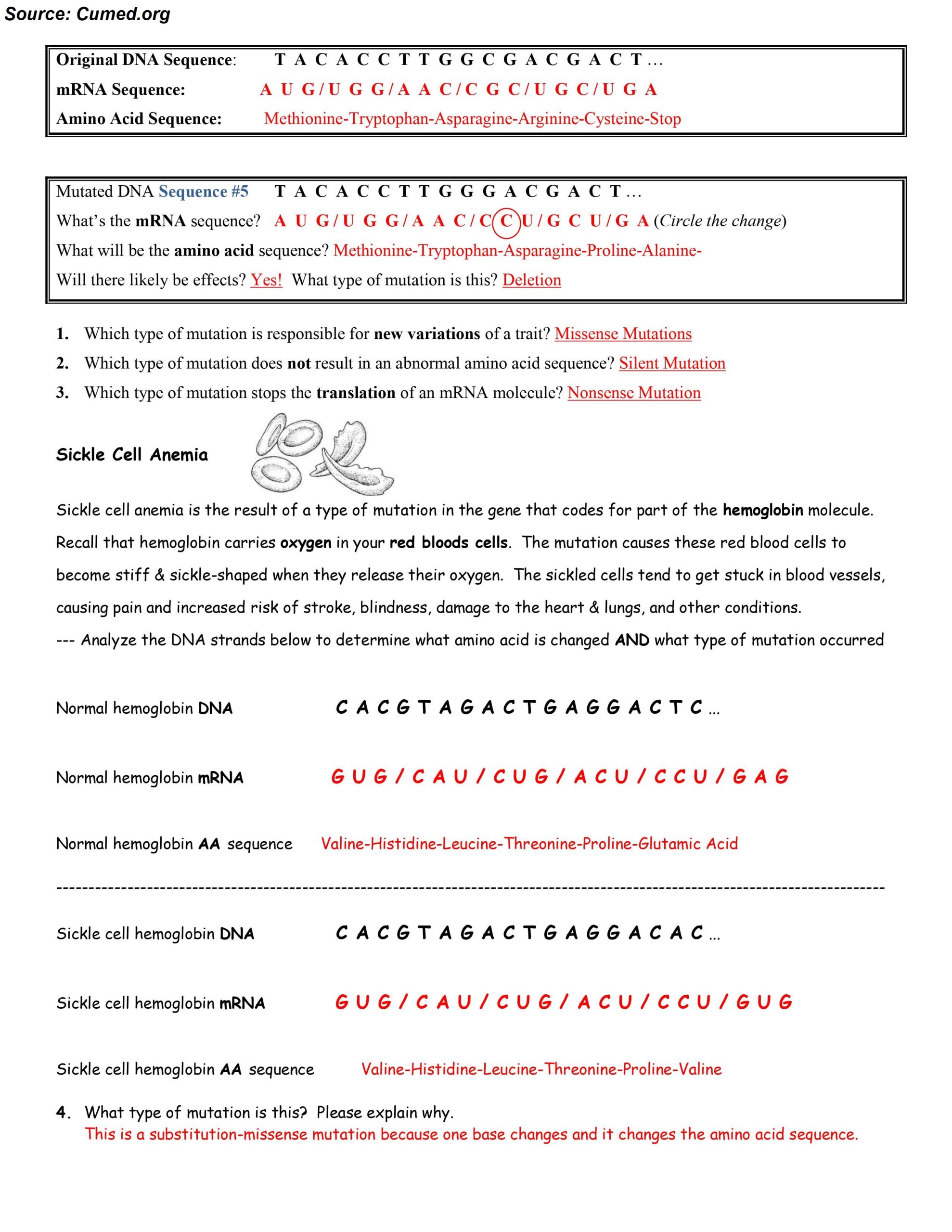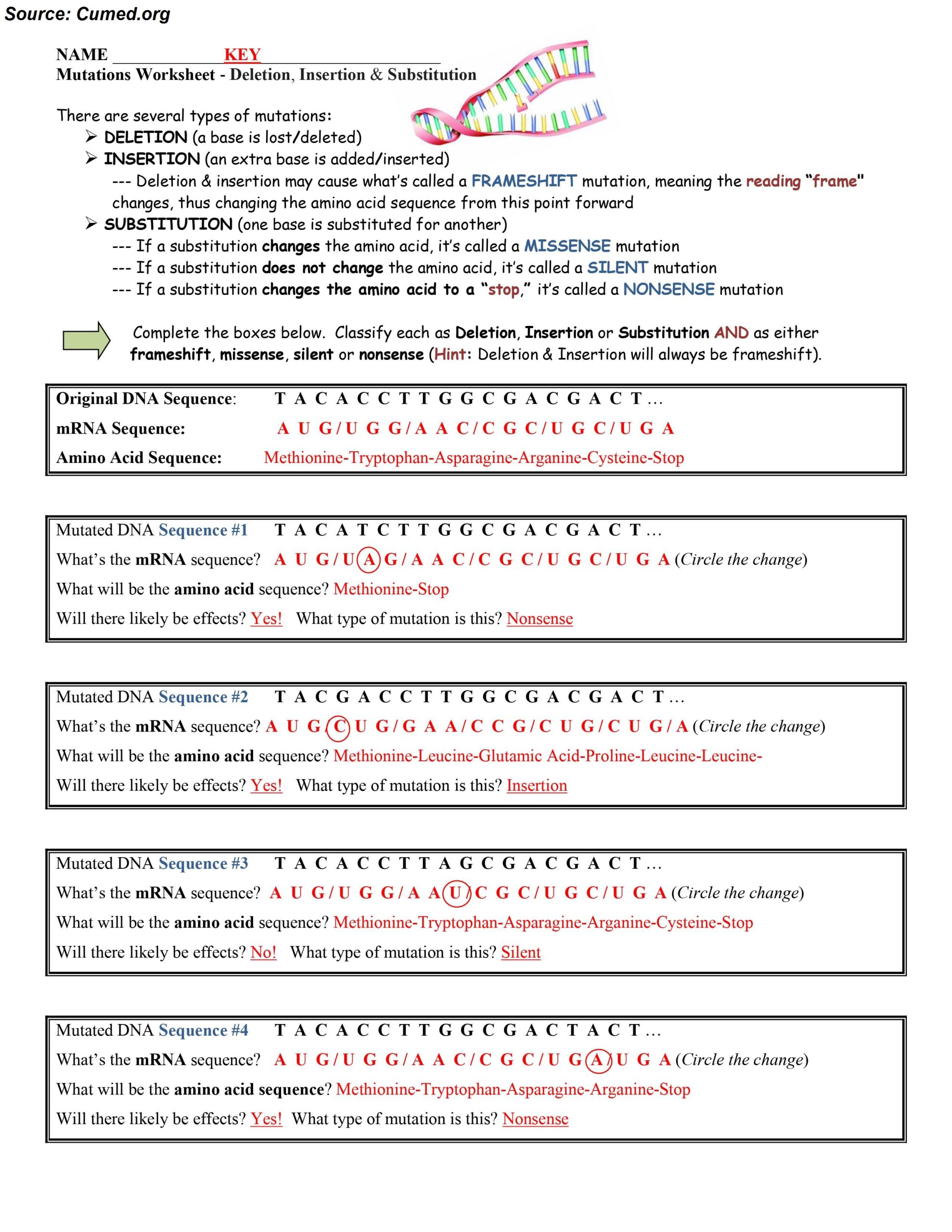The Mutations Worksheet Answer Key provides educators and students with a comprehensive guide to understanding the various types of genetic mutations. This answer key provides detailed explanations of the various types of mutations, as well as an explanation of the effects of each type of mutation. The worksheet also includes a sample problem, which demonstrates how different types of mutations can affect the genetic code. This answer key is a great resource for students and teachers who are looking to gain a deeper understanding of mutations and the impact they can have on genetic code.
Exploring the Different Types of Mutations and How They Affect the Answer Key
Mutations are changes in the genetic material of a cell that can lead to a variety of genetic disorders and phenotypic changes. Understanding the different types of mutations and their effects is essential for comprehending the biology and genetics of organisms.
The four main types of mutations are point mutations, deletions, insertions, and frame-shift mutations.
Contents
- 0.1 Exploring the Different Types of Mutations and How They Affect the Answer Key
- 0.2 Investigating the Role of Mutations Worksheet Answer Key in Genetic Engineering
- 0.3 Analyzing the Effects of Mutations Worksheet Answer Key on Health and Disease
- 0.4 Understanding the Significance of Mutations Worksheet Answer Key for Research and Diagnostics
- 0.5 Images of Mutations Worksheet Answer Key
- 0.6 Download Mutations Worksheet Answer Key
- 1 Conclusion
- 1.1 Some pictures about 'Mutations Worksheet Answer Key'
- 1.1.1 mutations worksheet answer key
- 1.1.2 mutations worksheet answer key pdf
- 1.1.3 mutations worksheet answer key biology
- 1.1.4 mutations worksheet answer key pdf quizlet
- 1.1.5 mutations worksheet answer key laney lee
- 1.1.6 mutations worksheet answer key part 1
- 1.1.7 mutations worksheet answer key back
- 1.1.8 mutations worksheet answer key biology answer key pdf
- 1.1.9 mutations worksheet answer key back page
- 1.1.10 mutations worksheet answer key front and back
- 1.2 Related posts of "Mutations Worksheet Answer Key"
- 1.1 Some pictures about 'Mutations Worksheet Answer Key'
Point mutations are single nucleotide base changes that can either cause the substitution of one nucleotide for another, also known as a transition, or the replacement of a purine base with a pyrimidine base, or vice versa, which is known as a transversion. Point mutations can be silent, meaning they have no effect on the phenotype, or can cause missense, which is the incorrect coding of an amino acid, or nonsense, which results in a stop codon that halts the synthesis of a functional protein.
Deletions are mutations where one or more nucleotides are removed from a gene sequence. Depending on their size, these deletions can lead to a frameshift mutation or cause a premature stop codon, both of which can result in non-functional proteins.
Insertions are mutations where one or more nucleotides are added to a gene sequence. Insertions can also lead to frameshifts, which can result in the production of a non-functional protein.
Frame-shift mutations are caused by the addition or deletion of one or more nucleotides in a gene sequence. These mutations can shift the reading frame of the gene, causing a different amino acid sequence to be produced. The resulting protein is usually non-functional.
These different types of mutations can have different effects on the affected organism. Some can be silent and have no effect on the phenotype, while others can have drastic effects that can be lethal. It is important to understand the various types of mutations and their effects in order to fully comprehend the biology and genetics of an organism.
Investigating the Role of Mutations Worksheet Answer Key in Genetic Engineering
The role of mutations worksheet answer key in genetic engineering is an important factor to consider when discussing the potential of this field. Genetic engineering is the manipulation of genetic material to create or change the characteristics of an organism. It has the potential to revolutionize the medical and agricultural industries, and has been used to create new medicines, crops, and even animals.
Mutations worksheet answer key plays an important role in understanding how genetic engineering works. Mutations are changes in the genetic code of an organism that can cause the organism to develop different traits. These changes can be beneficial or harmful, and can be passed down to the offspring of the organism. The answer key can help to identify which mutations are beneficial, and which are detrimental.
The answer key can also help to identify which mutations are needed in order to create a desired trait. A mutation worksheet answer key can help to identify which mutations are necessary to create a specific trait. For example, if scientists wanted to create a disease-resistant strain of wheat, they would need to identify which mutations would help to create this trait.
The answer key can also be used to identify which mutations are most favorable when considering the effects of genetic engineering on a particular organism. For example, a worksheet answer key can identify which mutations are most favorable for creating a disease-resistant strain of wheat, as opposed to a strain of wheat that is susceptible to disease.
Finally, the answer key can also help to identify which mutations are least favorable when considering the effects of genetic engineering on a particular organism. This can help to ensure that the genetic engineering process does not produce any negative effects on the organism.
Mutations worksheet answer key is an important tool when considering the potential of genetic engineering. It can help to identify which mutations are necessary to create a desired trait, and which are least favorable when considering the potential effects of genetic engineering on a particular organism. By using this answer key, scientists can better understand the potential of this field and make better decisions when manipulating genetic material.
Analyzing the Effects of Mutations Worksheet Answer Key on Health and Disease
Mutations are changes in the genetic material of a cell, which can cause certain diseases, or even affect the health of an individual. The effects of these genetic changes can vary greatly, depending on the type and location of the mutation. In this article, we will explore how different types of mutations can affect health and disease.
Point mutations are changes in a single nucleotide in the DNA sequence. These changes can alter the function of a gene and can lead to diseases such as cystic fibrosis and sickle cell anemia. Point mutations can also be silent, meaning they do not cause any noticeable effects.
Frame shift mutations occur when a nucleotide is added or removed from the DNA sequence. This causes the genetic code to be read incorrectly, resulting in the production of abnormal proteins. Frame shift mutations can cause severe diseases such as Tay-Sachs disease and Huntington’s disease.
Deletion mutations occur when a section of DNA is removed from the sequence. This can result in the loss of function of a gene, leading to diseases such as Duchenne muscular dystrophy and cystic fibrosis.
Duplication mutations occur when a section of DNA is duplicated, resulting in the production of abnormal proteins. This can lead to diseases such as Angelman syndrome and Prader-Willi syndrome.
Insertion mutations occur when a section of DNA is inserted into the sequence. This can also lead to the production of abnormal proteins, resulting in diseases such as Marfan syndrome and Charcot-Marie-Tooth disease.
Overall, mutations can have a wide range of effects on health and disease. It is important to understand the types of mutations and their potential effects in order to properly diagnose and treat genetic diseases. By studying mutations and their effects, we can gain insight into the complex mechanisms of genetic diseases and strive to develop treatments and cures.
Understanding the Significance of Mutations Worksheet Answer Key for Research and Diagnostics
Mutations occur when a single nucleotide in DNA is changed, resulting in a different outcome from the original gene sequence. Mutations play a vital role in both research and diagnostics, as they can be used to gain insight into the underlying causes of diseases and to develop treatments.
In research, mutations can be used to gain a better understanding of how genes and proteins function. By studying how different mutations affect the expression of a particular gene, scientists can learn how that gene affects the development and progression of a particular disease. Through this type of research, scientists can identify potential therapeutic targets or develop new treatments.
In diagnostics, mutations can be used to diagnose genetic diseases. By examining the genetic mutations present in a patient, doctors can determine if they have a particular genetic disorder or a higher risk of developing a certain condition. For example, mutations in the BRCA1 and BRCA2 genes are associated with an increased risk of breast and ovarian cancer, so testing for these mutations can help doctors identify which patients are at risk and may benefit from preventive measures.
Overall, mutations are essential for both research and diagnostics. By studying how these changes in DNA affect gene expression, scientists can gain a better understanding of how diseases develop and progress, allowing them to develop effective treatments. Furthermore, mutations can be used to diagnose genetic diseases and identify patients who are at a higher risk of developing certain conditions, allowing doctors to provide the best possible care for their patients.
Images of Mutations Worksheet Answer Key


Download Mutations Worksheet Answer Key
Download Mutations Worksheet Answer Key: click here
Conclusion
The Mutations Worksheet Answer Key was a helpful resource in understanding the various types of mutations and how they can affect an organism. It gave a good overview of the different types of mutations and their consequences. Furthermore, it allowed students to test their knowledge of mutations and how they affect the organism. Overall, the Mutations Worksheet Answer Key provided a useful resource for students to better understand the role of mutations in biology.
